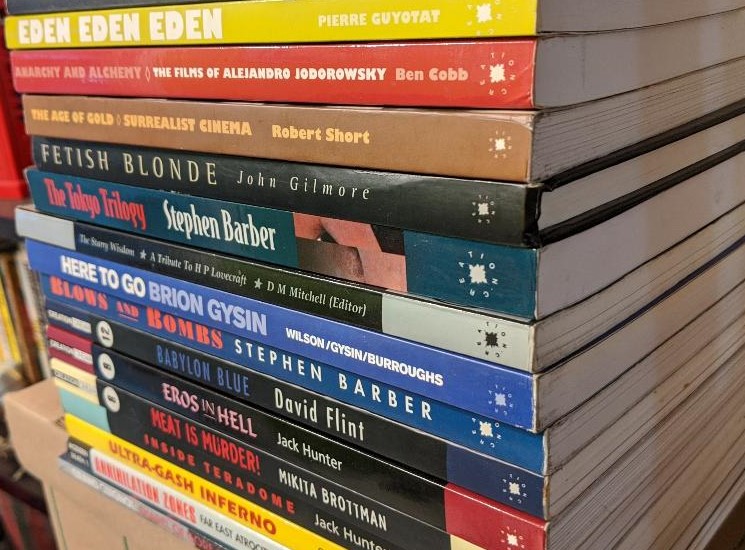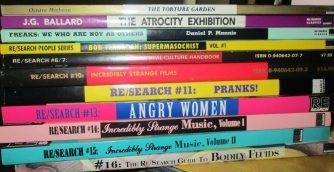 The demise of the UK’s Creation Books put an end not just to Creation’s tumultuous 25-year existence, but an entire era of fringe publishing.
The demise of the UK’s Creation Books put an end not just to Creation’s tumultuous 25-year existence, but an entire era of fringe publishing.
Instituted in 1989, Creation and its many imprints—Creation Oneiros, Velvet Books, Solar Books, Shimbaku, Wet Angel Books, Future Fiction, Elektron Ebooks—were known for freaky, outrageous and altogether essential publications like RED HEDZ (a little known splatterpunk classic), THE STARRY WISDOM (in my view the most interesting H.P. Lovecraft tribute anthology on the market), ULTRA-GASH INFERNO (a rare English language anthology of gross-out manga by Japan’s Suehiro Maruo), ANARCHY AND ALCHEMY (the definitive guide to the cinema of Alejandro Jodorowsky) and the outrageous TOKYO TRILOGY (an unforgettable three volume blast of pornographic lunacy). The latter books were written by Stephen Barber, who has said of Creation that “Nothing daunts them and no book project can appear too strange, outlandish or experimental, if they like it.”
It was Creation that provided the first, and thus far only, English translations of essential novels like Edogawa Rampo’s MOJU and Stephen Wul’s FANTASTIC PLANET, and introduced many readers (this one included) to anti-classics like Lucy Clifford’s demented kid book ANYHOW STORIES, John Wesley Hardin’s notorious outlaw memoir GUNFIGHTER, and Valentine Penrose’s Erzsbet Bathory bio-novel THE BLOODY COUNTESS, as well as the magnificently unhinged prose of “James Havoc”—a pseudonym for Creation’s co-founder James Williamson, who had an impeccable eye for weird and aberrant literature as both author and publisher.
Creation has in recent years been dogged by some ugly accusations, supposedly a primary reason they closed down. Of those accusations I’ll only say that I’ve never done business with Creation and so am in no position to comment one way or the other. I will, however, provide this link, in which the charges against Williamson, who single-handedly ran Creation during its final decades, are laid out. Creation’s ups and downs were quite extreme, and almost certainly matched by the equally rocky fortunes of its competitors.
The indie publishing scene of the late 1980s, when Creation was instituted, was dominated in the U.S. by the legendary punk- fueled outfit RE/Search, all of whose books are must-owns (the pioneering weird movie survey INCREDIBLY STRANGE FILMS and graphic-intensive reprinting of J.G. Ballard’s ATROCITY EXHIBITION in particular). Other underground publishers of note included Loompanics Unlimited, known for subversive how-to manuals; the Henry Rollins run 2.13.61, whose publication of M. Gira’s THE CONSUMER is required reading for all horror fans; and the aptly named Amok Press, which provided the fringe culture bible APOCALYPSE CULTURE, and which in 1989 split into three separate outfits: Amok Books, Feral House and Blast Books. In the U.K. there was Dedalus, which specialized in reprinting decadent-era classics, and Savoy, of the notorious LORD HORROR and its offshoots.
fueled outfit RE/Search, all of whose books are must-owns (the pioneering weird movie survey INCREDIBLY STRANGE FILMS and graphic-intensive reprinting of J.G. Ballard’s ATROCITY EXHIBITION in particular). Other underground publishers of note included Loompanics Unlimited, known for subversive how-to manuals; the Henry Rollins run 2.13.61, whose publication of M. Gira’s THE CONSUMER is required reading for all horror fans; and the aptly named Amok Press, which provided the fringe culture bible APOCALYPSE CULTURE, and which in 1989 split into three separate outfits: Amok Books, Feral House and Blast Books. In the U.K. there was Dedalus, which specialized in reprinting decadent-era classics, and Savoy, of the notorious LORD HORROR and its offshoots.
During the nineties those outfits thrived, or at least broke even (a victory in the independent publishing world). Unfortunately, as Williamson and many other fringe publishers have frankly acknowledged, the book business turned sour in the ‘00s.
In the early days of the internet it was widely assumed that the worldwide web would “democratize” the book world, allowing independent publishers a greater standing than they had in the eighties and nineties. Back then the book trade was dominated by chain stores and their risk-averse distributors, whose tastes dictated what titles ended up on bookstore shelves. It’s a fact that when choice is lacking people tend to look to the fringe, which certainly benefited the likes of Creation, RE/Search and Feral House. Unfortunately, it’s also true that when there’s too much variety people take refuge in the safe and familiar, which appears to be precisely what occurred once e-commerce gained prominence.
Today Loompanics is no more, having folded in 2006, while most of the rest of the abovementioned publishers have scaled back their output to almost nil. As for Creation, which admirably kept up its prolific output throughout the 00’s, its final publication was in 2013, with its various imprints finishing out their runs this year.
The future? Frankly I’m a bit scared to contemplate what might be in store for independent publishers. Given the severely decreased outputs of so many of them, and the spectacle of RE/Search’s V. Vale begging for “sponsorship” on the RE/Search website, I can’t help but wonder if Creation made the right move by shutting its doors. Yet there is one thing I can say with certainty: that without Creation the independent publishing scene will be a lot less interesting.
